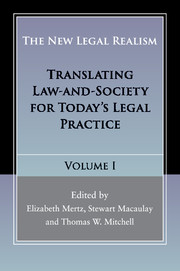Book contents
- Frontmatter
- Contents
- List of contributors
- Preface to The New Legal Realism, Volumes I and II
- 1 Introduction: New Legal Realism: Law and Social Science in the New Millennium
- Section I THE PLACE OF NEW LEGAL REALISM IN LEGAL THOUGHT AND TEACHING
- Section II PHILOSOPHY AND METHODS FOR A NEW LEGAL REALISM
- 6 Legal R/realism and Jurisprudence: Ten Theses
- 7 Legal Realism in Context
- 8 Legal Storytelling as a Variety of Legal Realism
- 9 Combining Methods for a New Synthesis in Law and Empirical Research
- Section III NEW LEGAL REALIST TRANSLATIONS
- Index
- References
8 - Legal Storytelling as a Variety of Legal Realism
from Section II - PHILOSOPHY AND METHODS FOR A NEW LEGAL REALISM
Published online by Cambridge University Press: 05 May 2016
- Frontmatter
- Contents
- List of contributors
- Preface to The New Legal Realism, Volumes I and II
- 1 Introduction: New Legal Realism: Law and Social Science in the New Millennium
- Section I THE PLACE OF NEW LEGAL REALISM IN LEGAL THOUGHT AND TEACHING
- Section II PHILOSOPHY AND METHODS FOR A NEW LEGAL REALISM
- 6 Legal R/realism and Jurisprudence: Ten Theses
- 7 Legal Realism in Context
- 8 Legal Storytelling as a Variety of Legal Realism
- 9 Combining Methods for a New Synthesis in Law and Empirical Research
- Section III NEW LEGAL REALIST TRANSLATIONS
- Index
- References
Summary
Legal storytelling is now very much in vogue. The Foundation Press's Law Stories series, compilations of pieces relating in detail the backgrounds of well-known cases – who the parties were and the social milieux they lived in, why and how their disputes began, what they wanted from the legal system and what their lawyers tried to get for them – has now gone into thirty-six volumes, with more still to come. A frontier outpost manned by a few pioneers beginning in the 1970s – Stewart Macaulay's background stories for his Wisconsin Contracts materials, Richard Danzig's (1978) inclusion of those stories and others of his own in his Capability Problem in Contract Law, followed by A.W.B. Simpson's (1997) Dickensian tales of English cases collected in Leading Cases in the Common Law – has become a flourishing settlement.
This storytelling enterprise, just as much as the revival of social science empiricism in legal scholarship, may be fairly be included in the New Legal Realism. It is certainly continuous with the old Legal Realism. Legal Realism was more than anything else a critical movement – critical of classical doctrines and modes of legal reasoning and, above all, critical of the claim that mastery of these doctrines and reasoning modes could accurately account for how cases were decided. The target of critique was, overwhelmingly, the law made by courts: the appellate case law that was the central material of the law school curriculum, the central concern of legal scholarship, and the sacred symbolic heartland of legal culture. Some of the legal realists were analytic critics, like Wesley Hohfeld or Robert Hale: they examined legal-doctrinal concepts on their own terms, and revealed their ambiguities and contradictions. Most realists had an empirically based critique: that the reasons judges gave for their decisions were inadequate and that the job of critics was to reveal the subtext of values, facts, or policies that would “really” explain the cases. To some, like Jerome Frank in Law and the Modern Mind (1930), these realities were factors inside the judicial mind: psychological whims or political or ideological biases. (This strain of realism eventually produced the “judicial behavior” school of political science.)
To other leading realists, the pattern of decisions was more regular and objective, but was dependent on factors not articulated in decisions. To discover those factors, one had to look beyond the stated grounds of decision.
- Type
- Chapter
- Information
- The New Legal RealismTranslating Law-and-Society for Today's Legal Practice, pp. 169 - 179Publisher: Cambridge University PressPrint publication year: 2016



